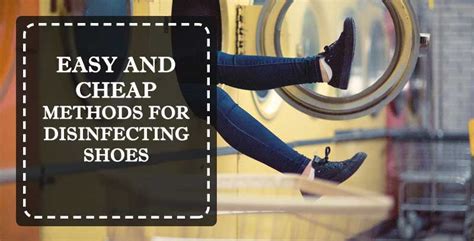Disinfecting Shoes: A Simple Step to Healthy Feet
Maintaining healthy feet often involves more than just regular washing. Our shoes, especially those worn for activities like workouts, gardening, or walking in public areas, accumulate a surprising amount of bacteria, fungi, and viruses. Disinfecting your shoes regularly is a simple yet effective way to protect your foot health and prevent potential infections. This comprehensive guide will explore the best methods for disinfecting your shoes and answer frequently asked questions.
Why Should I Disinfect My Shoes?
Our shoes are constantly exposed to various microorganisms. From the gym floor to the damp soil in your garden, these environments harbor numerous pathogens that can easily transfer to your feet. Failing to disinfect your shoes can lead to several problems, including:
- Athlete's foot: A common fungal infection causing itching, burning, and scaling between the toes.
- Bacterial infections: These can lead to unpleasant odors, skin irritation, and potentially more serious complications.
- Viral infections: Although less common, viruses can also survive on shoe surfaces and potentially transfer to your feet.
- Fungal nail infections (onychomycosis): These infections can cause discoloration, thickening, and crumbling of the toenails.
Regular disinfection minimizes the risk of these infections, especially important for individuals with pre-existing foot conditions or weakened immune systems.
How Often Should I Disinfect My Shoes?
The frequency of disinfecting your shoes depends largely on their use:
- Athletic shoes: These should be disinfected after each use, especially if worn in a shared gym or fitness center.
- Work boots: Disinfection is crucial after working in potentially contaminated environments like construction sites or farms.
- Everyday shoes: Weekly disinfection is recommended, especially during warmer months when bacteria and fungi thrive.
How to Disinfect Shoes: Effective Methods
Several methods effectively disinfect shoes, each with its pros and cons:
Using Disinfectant Spray
This is the most convenient method. Choose a disinfectant spray with broad-spectrum antimicrobial properties, ensuring it's safe for the materials of your shoes. Follow the manufacturer's instructions carefully, paying attention to the application time and any ventilation requirements. Always test a small, inconspicuous area first to check for any discoloration or damage.
Using Disinfectant Wipes
Similar to sprays, disinfectant wipes provide easy application. Thoroughly wipe the inside and outside of your shoes, including the insoles. Again, follow the product instructions and ensure the wipes are compatible with your shoe material.
Using a Shoe Deodorizer
While not a true disinfectant, shoe deodorizers can help eliminate unpleasant odors caused by bacteria. They often contain antimicrobial agents that can reduce the bacterial load but may not kill all types of fungi or viruses.
Sunlight and Air Drying
Exposure to sunlight is a natural disinfectant, helping to kill some bacteria and fungi. Allowing your shoes to air dry thoroughly after use also helps prevent the growth of microorganisms. This is a supplementary method and shouldn't replace proper disinfection.
What are the Best Disinfectants for Shoes?
Many commercially available disinfectants are suitable for shoes. Look for products containing active ingredients such as isopropyl alcohol (70%), quaternary ammonium compounds (quats), or hydrogen peroxide. Always check the product label to ensure it's safe for use on the material of your shoes (leather, fabric, etc.).
Can I Put My Shoes in the Washing Machine?
Some shoes, particularly athletic shoes made of washable materials, can be machine washed. Check the manufacturer's care instructions before attempting this. Use a gentle cycle and air dry thoroughly.
How to Disinfect Shoe Insoles?
Shoe insoles are breeding grounds for bacteria and fungi. Remove the insoles from your shoes and clean them separately. You can hand wash them with soap and water or, if they're machine washable, place them in a laundry mesh bag and wash in the machine. Allow them to dry completely before replacing them in your shoes.
Are there any specific disinfecting methods for different shoe materials?
Yes, different shoe materials require slightly different approaches. Leather shoes, for example, are more sensitive and may require gentler cleaning methods. Always refer to the manufacturer's care instructions before using any disinfectant. Fabric shoes generally tolerate a wider range of cleaning solutions.
By incorporating regular shoe disinfection into your routine, you take a proactive step towards maintaining healthy feet and preventing potential infections. Remember to always follow manufacturer instructions for both your shoes and your chosen cleaning agents. This simple practice can significantly improve your overall foot health and well-being.

